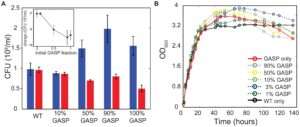In the relentless pursuit of quantum computing advancements, scientists have introduced a groundbreaking technique known as GASP (Genetic Algorithm for State Preparation). This innovative approach leverages the power of genetic algorithms to optimize state preparation on quantum computers. In this article, we explore the intricacies of GASP and its potential to revolutionize quantum computing capabilities.

Quantum computers are a promising new technology that have the potential to revolutionize a wide range of industries. However, one of the challenges of using quantum computers is that they are difficult to initialize in a specific state. This is because quantum states are very fragile and can be easily disturbed.
Quantum State Preparation Challenges
State preparation is a crucial process in quantum computing, involving the initial setup of quantum states for computation. Traditional methods of state preparation often face challenges in terms of efficiency and accuracy, especially with larger quantum systems.
The Power of Genetic Algorithms
Genetic algorithms are inspired by the principles of natural selection and evolution. They work by iteratively evolving a population of potential solutions to a problem, using mutation, selection, and recombination to find the most optimal solution.
How GASP Works
GASP employs genetic algorithms to find the optimal parameters for quantum state preparation. By encoding quantum state parameters as chromosomes and evaluating their performance through quantum fidelity, GASP efficiently explores the vast parameter space to discover the best preparation methods.
Enhancing Quantum Fidelity
The primary goal of GASP is to enhance quantum fidelity, ensuring that the prepared quantum states closely match the desired states. By continuously refining and evolving the parameters, GASP achieves remarkable improvements in state preparation accuracy.
Scalability and Versatility
One of the most significant advantages of GASP is its scalability. As quantum systems become increasingly complex, GASP’s ability to adapt and optimize state preparation for larger qubit systems becomes invaluable.
Accelerating Quantum Algorithms
Accurate state preparation is critical for the successful execution of quantum algorithms. By optimizing this foundational process, GASP accelerates the performance of various quantum algorithms, bringing us closer to the realization of practical quantum computing applications.
Advancing Quantum Technologies
The introduction of GASP opens up new possibilities for quantum technologies and applications. From quantum simulations to cryptography and optimization problems, the enhanced state preparation capabilities offered by GASP push the boundaries of quantum computing’s potential.


Some Interesting Facts :
- What is GASP?
- How does GASP work?
- What are the benefits of using GASP?
- What are the challenges of using GASP?
- What is the future of GASP?


The introduction of GASP, a genetic algorithm for state preparation on quantum computers, represents a significant leap forward in quantum computing research. By harnessing the power of genetic algorithms, GASP optimizes quantum state preparation, enhancing quantum fidelity, and accelerating the performance of quantum algorithms. As quantum computing continues to evolve, GASP’s scalability and versatility hold promise for unlocking the full potential of quantum technologies and transforming various industries with groundbreaking applications. GASP is a genetic algorithm that can be used to efficiently prepare quantum states on quantum computers. GASP has a number of benefits over other methods of state preparation, including its efficiency and robustness. The future of GASP is bright, and it is likely to become even more important as quantum computers become more powerful.
